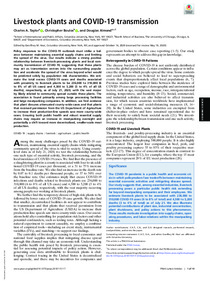Livestock plants and COVID-19 transmission

Taylor, Charles A. ; Boulos, Christopher ; Almond, Douglas
Proceedings of the National Academy of Sciences of the United States of America
2020
Early View
1-10
epidemic disease ; livestock rearing ; contagion ; value chains ; health policy ; agricultural sector
Agriculture, rural development and fishing
https://doi.org/10.1073/pnas.2010115117
English
"Policy responses to the COVID-19 outbreak must strike a balance between maintaining essential supply chains and limiting the spread of the virus. Our results indicate a strong positive relationship between livestock-processing plants and local community transmission of COVID-19, suggesting that these plants may act as transmission vectors into the surrounding population and accelerate the spread of the virus beyond what would be predicted solely by population risk characteristics. We estimate the total excess COVID-19 cases and deaths associated with proximity to livestock plants to be 236,000 to 310,000 (6 to 8% of all US cases) and 4,300 to 5,200 (3 to 4% of all US deaths), respectively, as of July 21, 2020, with the vast majority likely related to community spread outside these plants. The association is found primarily among large processing facilities and large meatpacking companies. In addition, we find evidence that plant closures attenuated county-wide cases and that plants that received permission from the US Department of Agriculture to increase their production-line speeds saw more county-wide cases. Ensuring both public health and robust essential supply chains may require an increase in meatpacking oversight and potentially a shift toward more decentralized, smaller-scale meat production."
Digital
The ETUI is co-funded by the European Union. Views and opinions expressed are however those of the author(s) only and do not necessarily reflect those of the European Union or the ETUI.